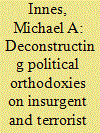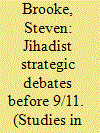|
|
|
Sort Order |
|
|
|
Items / Page
|
|
|
|
|
|
|
| Srl | Item |
| 1 |
ID:
080942


|
|
|
|
|
| Publication |
2008.
|
| Summary/Abstract |
Critics of the War on Terror have pointed to the futility of waging war on a tactic. Its emphasis on denying "sanctuary" and "safe havens" to terrorists, however, has also been informed by a political discourse that privileges the static, physical characteristics of refuge and the significance of state and territory in its provision. Locational issues have been exceptionally problematic, suggesting there is a need for deeper and more textured understanding of terrorist operating environments. This article seeks to widen the debate, encouraging the view that sanctuary is a complex terrain of material, human, and cognitive dimensions
|
|
|
|
|
|
|
|
|
|
|
|
|
|
|
|
| 2 |
ID:
080939


|
|
|
|
|
| Publication |
2008.
|
| Summary/Abstract |
This commentary examines the issue of global jihadist recidivism and identifies it as a potential long-term international counterterrorism concern. Although there are no comprehensive and accurate statistics on global jihadist recidivism, there is sufficient anecdotal evidence that suggests that the tendency for released imprisoned global jihadist terrorists is to return to terrorist activity. It is important to understand that arresting, indicting, and sentencing a captured global jihadist terrorist is not the end of the counterterrorism skirmish. In fact, the next stages of incarceration and reformation are more crucial to the endgame. The problem of global jihadist recidivism is at the core a manpower issue. Prisons have always been an important front for all types of terrorist groups. Recidivism or the failure of prison rehabilitation programs is simply one component of this front. Terrorist groups do not want their imprisoned members to reform and resign from the organization. Further research needs to be conducted on the recidivism rate for terrorists and whether religious terrorists would have a higher rate than secular ones. The academic, think tank, and U.S. government communities need to examine this issue to determine if it is a long-term international counterterrorism problem. The author believes it will be
|
|
|
|
|
|
|
|
|
|
|
|
|
|
|
|
| 3 |
ID:
080938


|
|
|
|
|
| Publication |
2008.
|
| Summary/Abstract |
This article reviews Iran's past and current use of terrorism and assesses why U.S. attempts to halt Iran's efforts have met with little success. With this assessment in mind, it argues that Iran is not likely transfer chemical, biological, or nuclear weapons to terrorist groups for several reasons. First, providing terrorists with such unconventional weapons offers Iran few tactical advantages as these groups are able to operate effectively with existing methods and weapons. Second, Iran has become more cautious in its backing of terrorists in recent years. And third, Tehran is highly aware that any major escalation in its support for terrorism would incur U.S. wrath and international condemnation. The article concludes by offering recommendations for decreasing Iran's support for terrorism
|
|
|
|
|
|
|
|
|
|
|
|
|
|
|
|
| 4 |
ID:
080940


|
|
|
|
|
| Publication |
2008.
|
| Summary/Abstract |
In 2004 Lia and Hegghammer observed a new genre of "jihadi strategic studies," characterized by secular-rational analyses, familiarity with Western sources, and a willingness to self-critique. Through four case studies (the strategies of takfir groups in 1960/1970s Egypt, the far enemy-near enemy debate, the differing revolutionary modes of Al Jihad and Gamaa Islamiyya, and the decision by Al Qaeda to target the West) this article finds that many of the traits observed by Lia and Hegghammer have deep roots among jihadist thinkers. This article will interest those who study terrorism, strategy, and the history of Islamic militancy
|
|
|
|
|
|
|
|
|
|
|
|
|
|
|
|
| 5 |
ID:
080941


|
|
|
|
|
| Publication |
2008.
|
| Summary/Abstract |
A recent increase in terrorist actions where the terrorist's death is planned and intentional has raised interest in the psychological functioning, motivation, and reasoning of those who engage in terrorism and those who support it. No consensus exists among Western1 psychologists regarding terrorists who plan to die in their attack, and no Western psychological perspective has thus far contributed substantively to explaining or predicting it. Although most agree that groups engaging in such actions typically have a wider network of support, the psychology of supporters is also unexplained. This article proposes a developmental psychological model of the conditions that favor focused terrorist actions that have publicly discernible goals ascribed to a political or religious cause. The article describes a common pattern of cognitive complexity among terrorist leaders, using Osama bin Laden as a model, where entrenched cognitive simplicity in one key ideological domain (religious or political) is coupled with behavior reflecting the capacity for far greater complexity in other domains (organizational skills, planning, problem-solving.) This pattern, in specifiable historical and ecological context, makes terrorist tactics, including those in which the attacker intentionally dies, more likely, and increases the challenges associated with attempts at diplomacy or negotiated peace
|
|
|
|
|
|
|
|
|
|
|
|
|
|
|
|
|
|
|
|
|